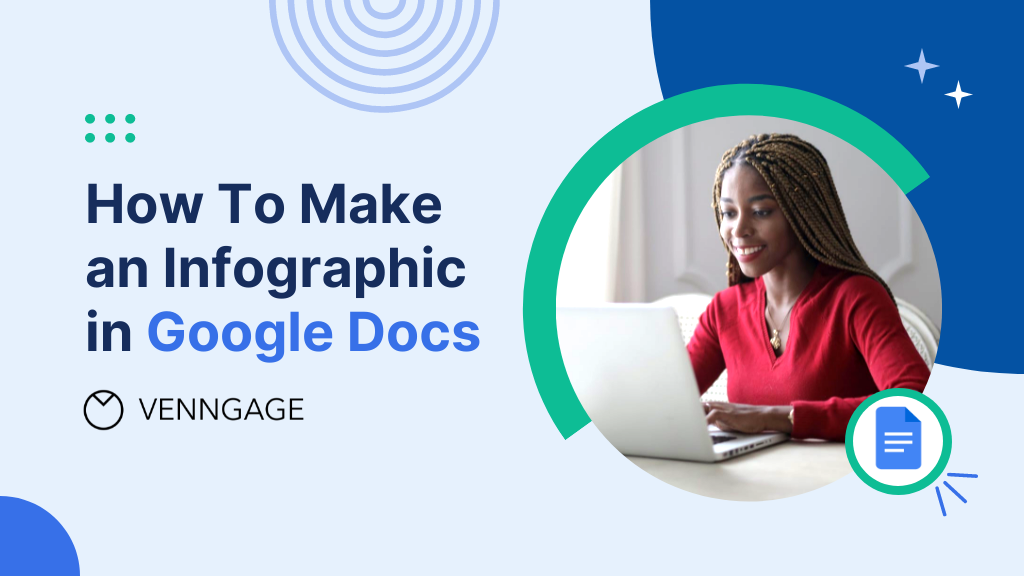
Google Docs is free, easy to access, and familiar. That’s why many people use it to design infographics. The problem? It lacks professional templates, flexible layouts and design features needed to create visuals that stand out.
In this guide, I’ll show how to make an infographic in Google Docs, and then how to create a better one using a professional Infographic Maker and infographic templates.
Figure out which infographic type you should create (before you open Docs)
If you’re making an infographic, pick one that’s best suited to present your information.
Although there are many types of infographics, for most use cases, you can stick to the following six.
Note: For each example below, to recreate the example in Google Docs, you would have to draw the infographic manually using in-built shapes and the import images feature.
1. Statistical infographics
Statistical infographics are your go-to when it comes to data visualization.
These infographics help you share findings such as results from an employee survey, the latest research findings and more.
Here’s an example of a statistical infographic:

2. Informational infographics
Informational infographics are great if you want to summarize large chunks of text into a smaller, more digestible format.
Again, visual elements are vital in informational infographics to reinforce concepts visually.
Here’s an example:

3. Timeline infographics
Timeline infographics help you present information in chronological order.
They’re perfect if you want to illustrate the progression of facts or figures in a format that is easy to follow.
Here’s an example of a timeline infographic:

4. Comparison infographics
Want to do a side-by-side comparison of two or more items? Comparison infographics can highlight differences and similarities, making them ideal for use cases such as product reviews.
Here’s a comparison infographic that highlights the differences between cold and hot showers:

5. Geographic infographics
Geographic infographics help visualize data related to specific regions or locations.
For example, let’s say you want to show where population density is highest in the US. Instead of a table of numbers, a color-coded map is more impactful.
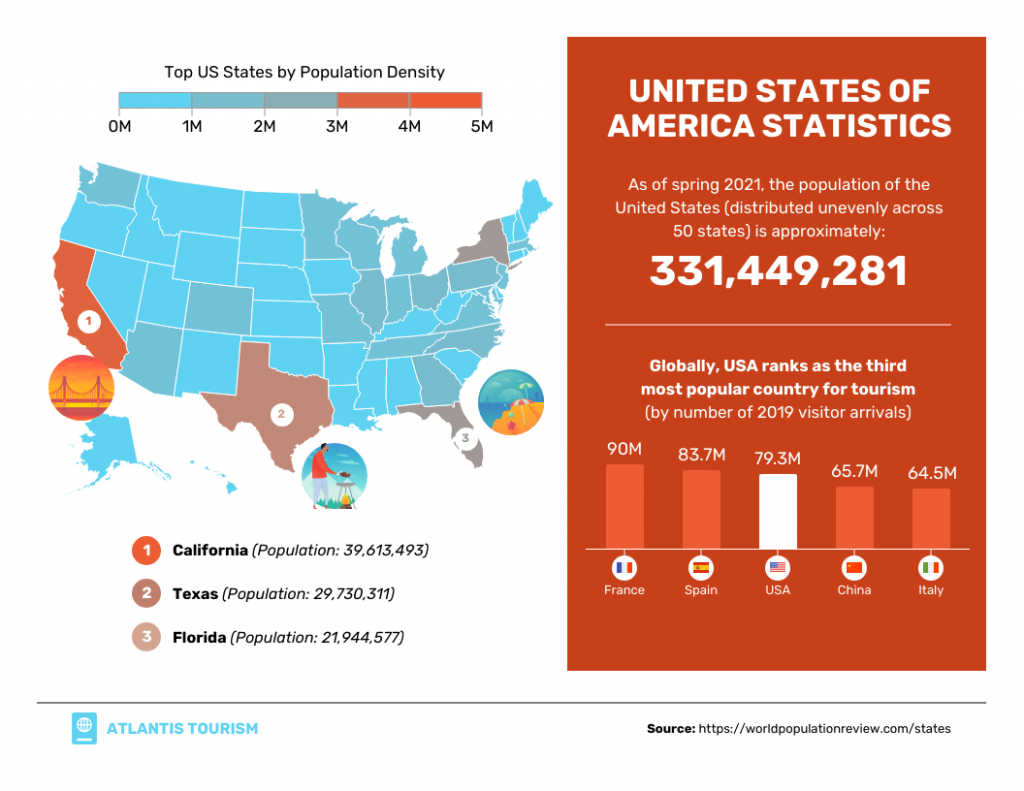
6. Process infographics
Process infographics let you present a series of steps or stages in a clear and organized manner which makes them ideal to explain procedures, workflows or the progression of tasks.
Here’s an example of a process infographic:
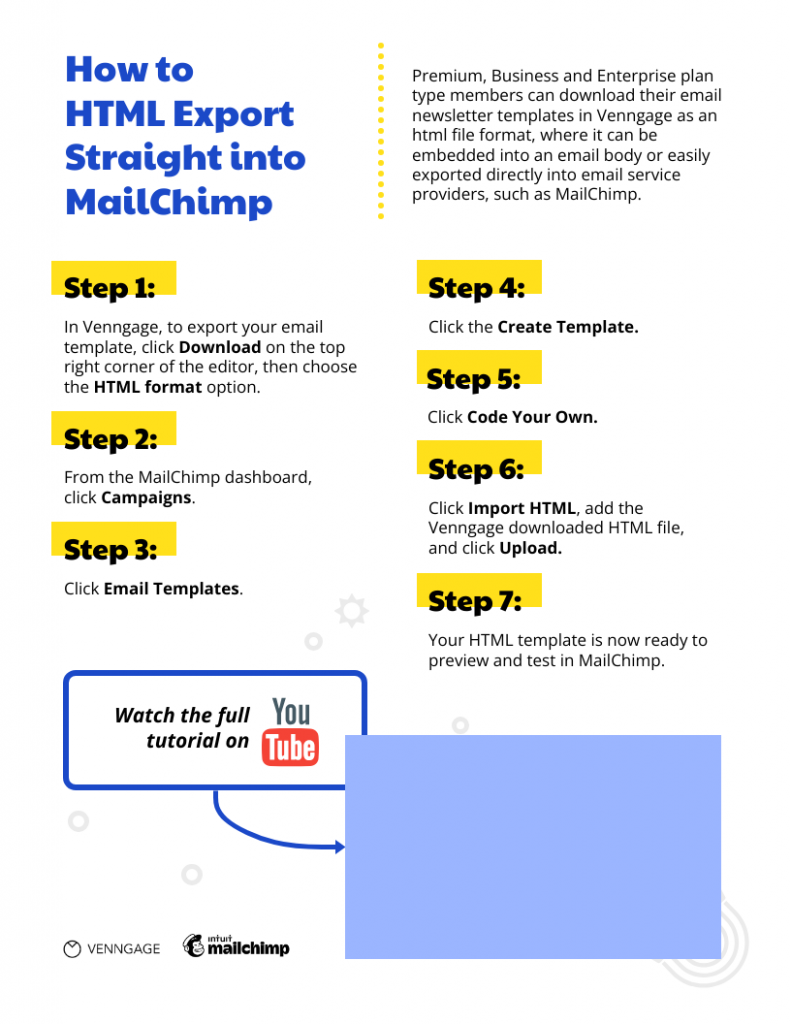
When to upgrade: The limits of Google Docs
Google Docs can work for basic visuals, but it isn’t built for professional infographic design. Here’s where it falls short:
- No templates: Everything starts from a blank page.
- Manual alignment: Spacing and positioning require constant adjustment.
- Limited charts: Charts appear outside your design, not inside it.
- Basic icons: No built-in icon library for visual storytelling.
- No brand control: No brand kits, fonts, or one-click styling.
- Time investment: Simple layouts take longer than they should.
If you’re designing infographics often or need polished results, it’s worth switching to a dedicated tool.
How to make professional infographics with Venngage
If you want polished, professional infographics without designing from scratch, Venngage makes it easy.
Venngage offers thousands of editable templates, built-in icons, charts, maps and data tools—all in a drag-and-drop editor. Some templates are free and signing up costs nothing.
Quick steps:
- Sign up (free with email or Google)
- Choose a template (from dozens of infographic categories)
- Customize with icons, colors, fonts, charts or use the Brand Kit for auto-branding
- Share with a public link or upgrade to download
You can also start from scratch or generate a design instantly using the AI Infographic Generator.
For anyone serious about visual content, Venngage saves time and delivers better-looking results than Google Docs.
How to make an infographic in Google Docs
You can create an infographic in Google Docs, but it takes manual work. Here’s a quick walkthrough of how to build a simple list-style infographic using built-in tools.
Quick overview of the process
- Create a blank document in Google Docs
- Set your page orientations (Click “File” > “Page Setup“)
- Use shapes to create an infographic structure
- Add your text and images
- Customize your infographic with color and/or fonts
- Review, finalize and export your design
Now here’s how it works in practice.
Step 1: Create a new document in Google Docs
Open Google Docs and start with a blank document. If you’re already in a file, go to File → New → Document.

Step 2: Set up your page
In Google Docs, you need to specify the layout and dimensions of the page for infographics.
This is to ensure your infographic fits within the canvas and compatibility reasons if you plan to print the infographic later on.
Go to File → Page setup to choose orientation and size. Landscape works best for infographics (set your page to 11″ × 8.5″ or A4 for printing).
Once done, click on “OK“.

Step 3: Add shapes to create an infographic structure
Google Docs doesn’t offer infographic templates, so you’ll design from scratch. Go to Insert → Drawing → New and manually add shapes.
Tip: Copy and paste shapes to keep sizes consistent.

You’ll find a range of shapes, from squares and circles to arrows:
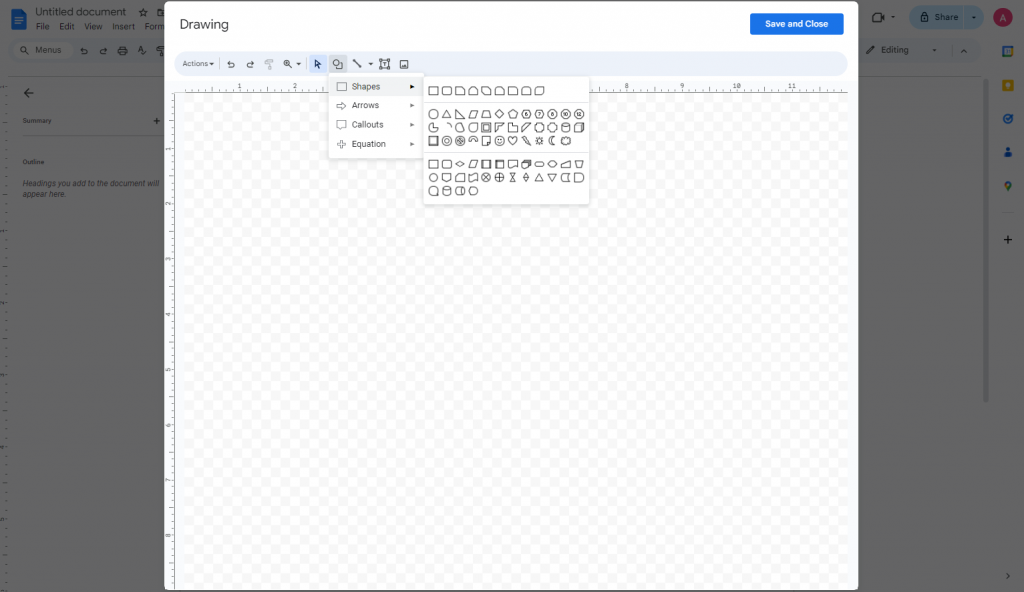
I’ll use three rectangles to act as separate blocks in an informational infographic.
Note: Since it’s hard to recreate rectangles of the same size, I had to copy-paste them.
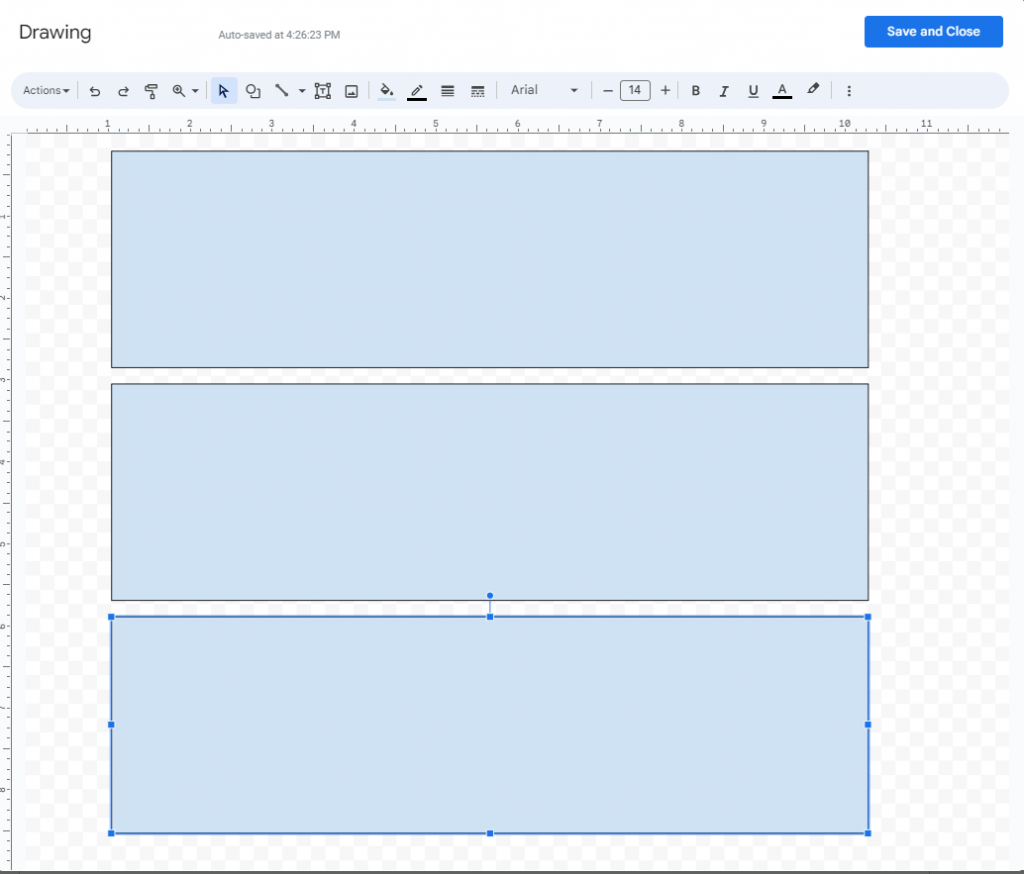
Make sure to “Save” and “Close” once done.
Step 4: Add your text and images
Now that you have the basic structure, it’s time to add content.
Click on your infographic in Docs and select the “Edit” button.
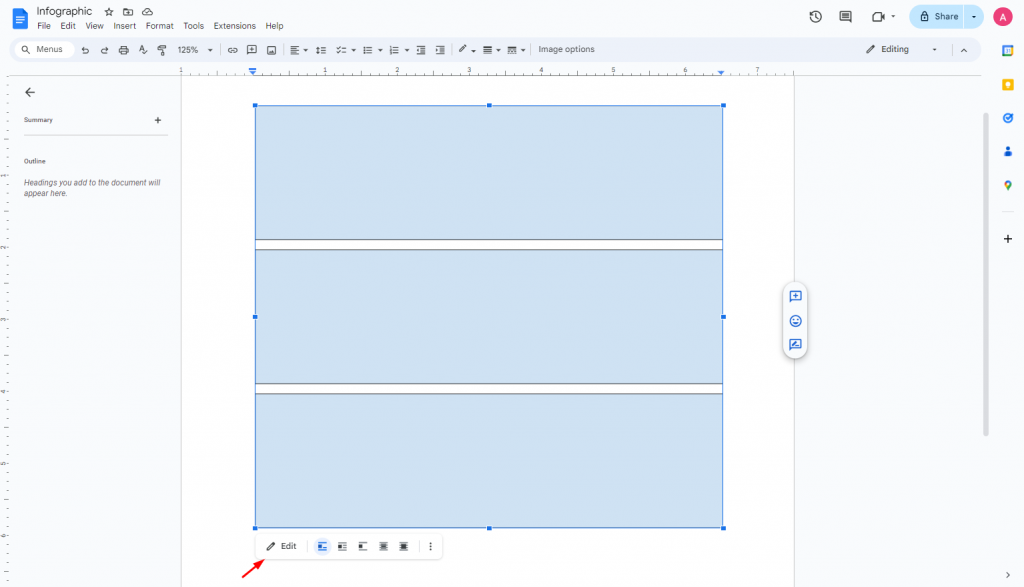
The drawing window should open up again. This time, we’ll select the “Textbox” option.
While adding the text was fairly simple, getting the textboxes to align was a pain using the Google Docs ruler at the top.
To add images, select the “Image” option.
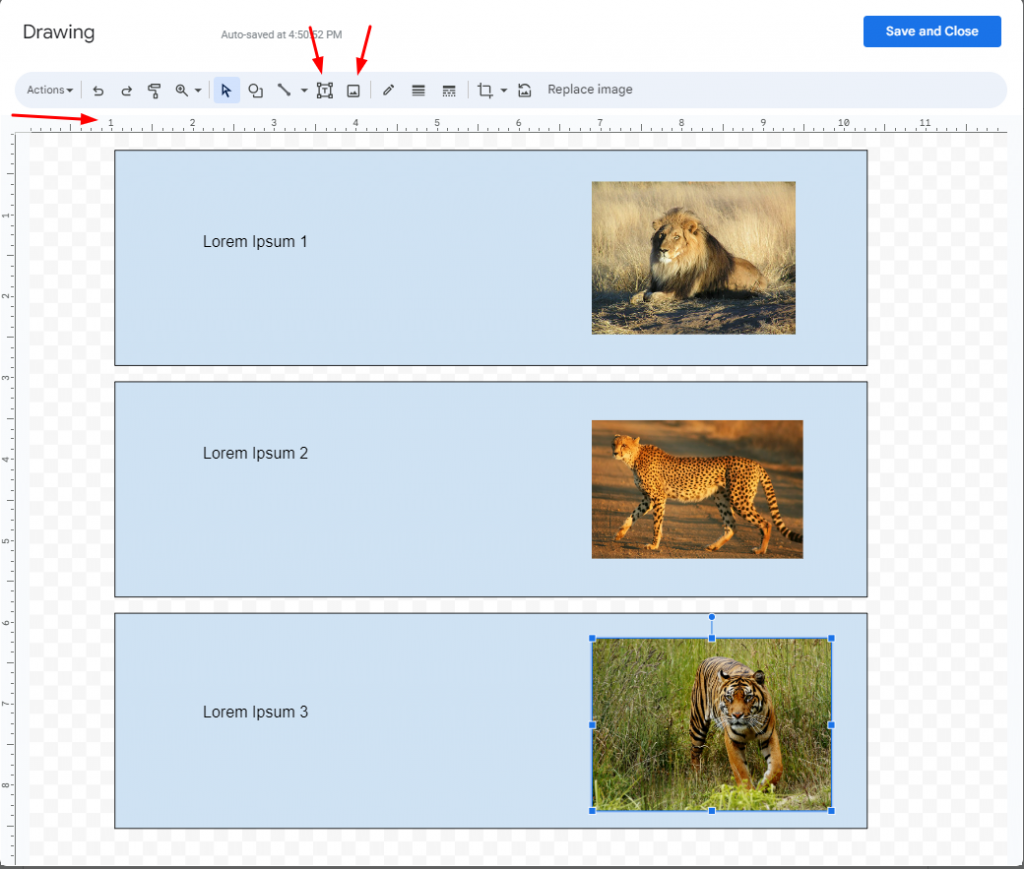
Step 5: Customize your infographic
Use “Fill” and “Border Weight” settings to add color and visual hierarchy. You can insert charts, but they’ll appear outside your infographic, not inside it.
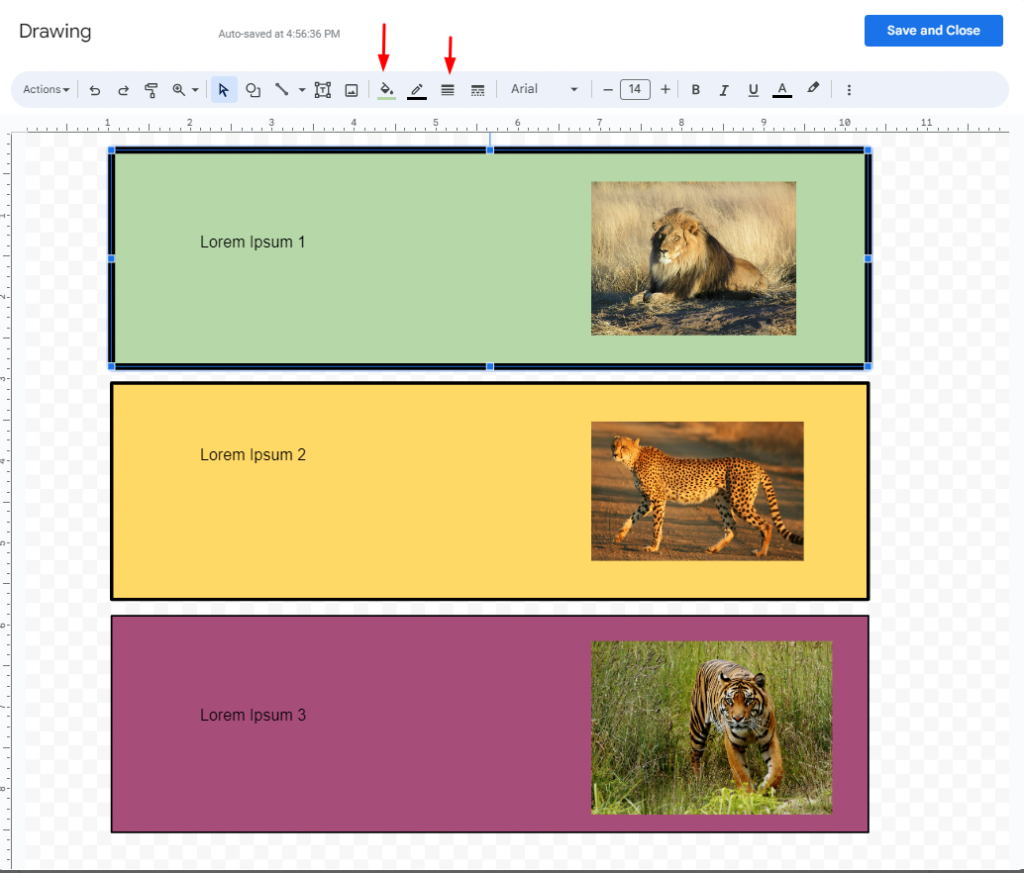
Advanced tips: Align, group and layer like a pro
- Group objects: Select multiple elements (Shift + click) → Arrange → Group to move and resize them together.
- Layering: Right-click an object → Order → Send to back/front to control what appears on top.
- Precise alignment: Hold Shift while dragging to keep objects aligned. Enable snapping via View → Snap to grid for cleaner layouts.
Step 6: Review, finalize and export
Once you’re happy with your creation, click on “File” > “Download” > “PDF” to export your infographic.
Otherwise, since Google Docs is part of the Google Apps ecosystem, you can always find your infographic in Google Drive as well.
That’s it, you’ve made an infographic in Google Docs.
It works, but it’s basic. Getting everything aligned and polished takes time, and the final result often looks… homemade. If you want a professional design without the struggle, an infographic maker with templates makes a big difference.
Frequently Asked Questions (FAQs)
Got questions about creating infographics in Google Docs? Here are the answers you need.
Does Google Docs have infographic templates?
No, Google Docs does not offer infographic templates. If you want easy-to-use templates to add infographics to Google Docs, consider using Venngage infographic templates.
Can you create an infographic in Google Docs?
Yes, you can create infographics manually in Google Docs. However, dragging and dropping shapes in places and manually entering text and images will take time. Also, you won’t get access to any pre-built templates that can help you speed up the process.
Where can I get free infographic templates?
The best place to find free infographic templates is online, but not all tools are worth your time. Some have steep learning curves, limited customization or hidden costs. That’s why choosing a reputable brand with free plans or trials is a smart move before committing financially.
Prioritize ease of use over just finding a free option. An intuitive editor saves time and frustration.
Venngage checks all of these boxes. Plus, it comes with over 10,000 ready-to-use infographic templates for a wide range of use cases. You’ll never run out of options no matter what you’re looking for. You can also use Venngage’s Brand Kit to personalize templates and scale your infographic production.




































